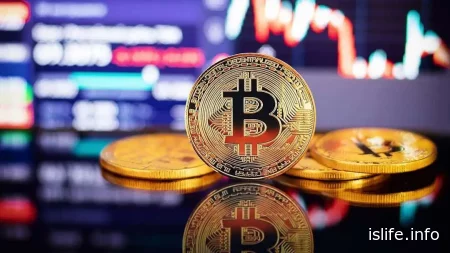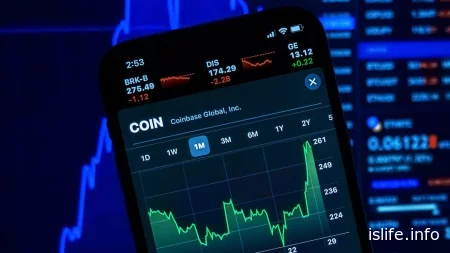If you've ever thought about buying, selling or exchanging cryptocurrency, then most likely the first thing you came across is the concept of a "cryptocurrency exchange". This is not just a platform for buying bitcoins, but a complex mechanism that is the heart of the entire crypto market. But how do you choose the right, reliable and profitable platform from hundreds of offers? Where can you find the best exchanges? And, most importantly, how can you work with it safely? Today we will take a detailed look at what a cryptocurrency exchange is, how it functions, what to look for when choosing, and also present our rating of cryptocurrency exchanges.
The world of digital finance is constantly evolving, and the cryptocurrency exchange has become an integral part of this landscape. It offers huge opportunities for investors and traders, but at the same time it carries certain risks. Therefore, understanding the principles of exchanges and their features is the key to successful and safe interaction with cryptocurrencies. Let's dive into this fascinating world.
↑ What is a cryptocurrency exchange and how does it work?
So, what is a cryptocurrency exchange? At its core, a cryptocurrency exchange is an online platform that allows users to buy, sell, and exchange cryptocurrencies for each other, as well as for fiat money (dollars, euros, rubles, etc.). Unlike exchangers, which act as intermediaries and offer their own rates, a cryptocurrency exchange acts as a platform where transactions are made directly between buyers and sellers at the market rate.
↑ How does a crypto exchange work?
Imagine a classic financial market where buyers and sellers trade stocks or currencies. A cryptocurrency exchange works on a similar principle:
- Order book (order book): This is the central element of any exchange. It displays all active buy (bids) and sell (ask) orders at various prices. Bids are offers to buy an asset at a specific price, while asks are offers to sell.
- Matching Engine: This is a software that automatically matches bids from buyers and sellers. Once the bid and ask prices match, the trade is executed.
- Order Types: Users can place different types of orders:
- Market Order: Executes immediately at the best current market price. Good for quick buy/sell, but the rate may not be optimal.
- Limit Order: Allows you to set a specific price at which you want to buy or sell an asset. The order will only be executed when the price reaches the specified value. This helps control when you enter/exit a trade.
- Stop-Limit Order: A combination of a stop order (which is activated when a certain price is reached) and a limit order (which is then placed at the specified price). Used to minimize losses.
- OCO (One Cancels the Other): Two orders, one of which cancels the other if it is executed.
Thus, a crypto exchange is a complex but effective system that provides market liquidity and the opportunity for millions of people around the world to participate in trading digital assets. It is on these platforms that the main quotes are formed, which are then distributed throughout the crypto community.
↑ Centralized (CEX) vs. Decentralized (DEX) Exchanges
The world of crypto exchanges is not uniform. There are two fundamentally different types, each of which has its own advantages and disadvantages:
↑ Centralized Exchanges (CEX)
Description: This is the most common type of cryptocurrency exchange. They are managed by a single company (e.g. Binance, Coinbase, Bybit). Users trust their funds to the exchange, which stores them in its wallets.
Advantages:
- Ease of use: Simple and intuitive interface, especially for beginners.
- High liquidity: Large trading volumes ensure fast execution of orders at favorable prices.
- Fiat support: The ability to directly replenish the account from a bank card or bank transfer.
- Additional services: Often offer staking, lending, launchpads, P2P exchange.
- Support: The presence of a centralized support service that can help solve problems.
Disadvantages:
- Centralization risks: Users do not own their private keys (your coins are stored on the exchange wallets). In case of hacking of the exchange or fraud by the administration, you can lose your funds.
- Regulatory risks: Exchanges are subject to the jurisdiction of the countries in which they are registered and may be forced to freeze accounts or provide user data upon request of the authorities.
- KYC/AML requirements: Most large centralized cryptocurrency exchanges require identity verification (KYC - Know Your Customer) and compliance with anti-money laundering (AML - Anti-Money Laundering) rules. This can be a disadvantage for those looking for exchanges without verification.
↑ Decentralized exchanges (DEX)
Description: A decentralized exchange operates on the basis of smart contracts in the blockchain. Users trade directly with each other, maintaining full control over their private keys. Funds never leave personal wallets until the trade is executed.
Advantages:
- Security and anonymity: You retain control over your private keys. There is no central point of failure, reducing the risk of the exchange being hacked. Often allow trading without KYC, making them attractive to those looking for a crypto exchange without verification.
- Censorship Resistance: The lack of a central authority makes them less susceptible to regulatory pressure and blocking.
- Access to New Tokens: Often new tokens are released on a DEX first before making their way to a CEX.
Cons:
- Difficult to Use: The interface can be less intuitive for newcomers.
- Low Liquidity: Compared to larger CEXs, liquidity on many DEXs is lower, which can lead to price slippage.
- High Fees (Gas): Transactions on DEXs are subject to a network fee (gas), which can be high during busy periods.
- No Fiat: Only crypto to crypto exchanges, no direct fiat input/output.
- No support service: In case of problems, you will have to figure it out yourself.
Understanding the difference between CEX and DEX is extremely important. If you want a crypto exchange without verification, then your path lies rather to DEX, but with an understanding of all their nuances.
↑ What to look for when choosing a cryptocurrency exchange?
Choosing a cryptocurrency exchange is one of the key decisions on your path to the world of digital assets. The wrong choice can cost you money, time and nerves. To find the best exchanges for your needs, pay attention to the following parameters:
- Security and reputation:
- Hack history: Research whether the exchange has had any security incidents.
- Presence of insurance funds: Some exchanges create funds to compensate users for losses in the event of a hack (for example, Binance's SAFU).
- Two-factor authentication (2FA): A must for your personal security.
- User reviews: Read reviews on independent platforms and forums.
Fees and charges:
- Trading fees: Usually, there are taker and maker fees. Compare them across different exchanges.
- Fees for deposits/withdrawals: The fees for cryptocurrency withdrawals (network fees) and fiat deposits/withdrawals are especially important.
- Hidden fees: Some exchanges may have hidden fees.
Liquidity and trading volume:High liquidity means that you will be able to quickly buy or sell an asset at a fair market price without significant slippage. You can check this on CoinMarketCap or CoinGecko. The top crypto exchanges will always have high liquidity. Supported cryptocurrencies and trading pairs:Make sure that the crypto exchange supports the coins and trading pairs that you are interested in. KYC/AML requirements: If anonymity is important to you, look for exchanges without verification (usually DEXs or some CEXs with limited functionality). But remember that this comes with certain risks and limitations. Usability and interface: Especially for beginners, an intuitive interface, the presence of a mobile application and ease of navigation are important. Support service: Availability of a prompt and competent support service available in your language. Additional services: Availability of margin trading, futures, staking, launchpads, P2P exchange and other features that may be of interest to you.
↑ TOP 10 Cryptocurrency Exchanges (2024): Rating and Features
Collecting an absolute top 10 exchanges is not an easy task, as the market is constantly changing and user needs vary. However, based on factors such as trading volume, liquidity, security, reputation and range of services, we can highlight the most reputable and popular cryptocurrency exchanges. Below is a top cryptocurrency exchange that dominates the market and offers a wide range of services.
↑ Binance:
- Features: The world's largest cryptocurrency exchange by trading volume. The widest selection of cryptocurrencies, a huge number of trading pairs, futures, options, staking, farming, its own blockchain (BNB Chain), P2P platform.
- Pros: High liquidity, low fees (especially with BNB), a large number of services.
- Cons: Strict KYC/AML requirements, regulatory difficulties in some countries.
- Who is it for: Everyone - from beginners to experienced traders. These are definitely the best exchanges for most users.
↑ Coinbase:
- Features: One of the oldest and most regulated exchanges, especially popular in the US. Easy to use, great interface for beginners.
- Pros: High security, asset insurance, easy fiat purchase.
- Cons: Higher fees than Binance, limited altcoin selection, strict regulation.
- Suitable for: US beginners, institutional investors, those who value maximum reliability and simplicity.
↑ Bybit:
- Features: Initially focused on derivatives, but is actively developing spot trading and other services.
- Pros: Low fees, excellent liquidity on futures, innovative products, good P2P exchange.
- Cons: Less extensive selection of altcoins than Binance.
- Suitable for: Traders derivatives, active spot traders. Takes its place in the top crypto exchanges.
↑ OKX:
- Features: Global crypto exchange with a wide range of products: spot, futures, options, DEX, NFT marketplace, its own blockchain (OKC Chain).
- Pros: Large selection of instruments, competitive fees, high performance.
- Cons: Can be difficult for beginners.
- Who is it for: Experienced traders, those looking for comprehensive solutions.
↑ Kraken:
- Features: The oldest and one of the safest exchanges, known for its strict regulation and reliability.
- Pros: High security, good reputation, fiat currency support, staking.
- Cons: Less altcoin selection, not as intuitive an interface as others.
- Best for: Investors who value security and reliability, especially from North America and Europe.
↑ KuCoin:
- Features: "Exchange for altcoins". Supports a huge number of small and new projects.
- Pros: Widest selection of altcoins, low fees, P2P trading.
- Cons: Sometimes faces regulatory issues, not as easy for beginners as Binance.
- Who is it for: Experienced altcoin traders, crypto enthusiasts looking for new projects.
↑ Gate.io:
- Features: Also focused on altcoins, offers many little-known tokens.
- Pros: Huge selection of cryptocurrencies, IEO support, availability of DeFi products.
- Cons: Can be overloaded for beginners, not always high liquidity for all pairs.
- Who is it for: Experienced investors looking for new projects with high risk/potential.
↑ MEXC Global:
- Features: Fast-growing crypto exchange that attracts users with low fees and a large selection of trading pairs.
- Pros: Low fees, extensive list of altcoins, user-friendly interface.
- Cons: Relatively young, not as well regulated as the big players.
- Who is it for: Active traders looking for new opportunities.
↑ Bitget:
- Features: Strengths in copy trading and futures.
- Pros: Excellent functionality for copy trading, good trading conditions for derivatives.
- Cons: Smaller spot trading volume than leaders.
- Who it's good for: Traders interested in copy trading and futures traders.
↑ HTX (former Huobi):
- Features: One of the oldest Asian exchanges with a good reputation.
- Pros: Wide selection of assets, developed ecosystem, stable operation.
- Cons: Difficulty in access for some regions due to regulation.
- Who it's good for: Experienced traders, especially from Asia.
Of course, this top 10 exchanges may change, but these platforms are the market leaders.
↑ Advantages and disadvantages of using cryptocurrency exchanges
Like any financial instrument, a cryptocurrency exchange has its pros and cons, which are important take into account.
Advantages:
- High liquidity: Allows you to quickly buy and sell assets at market prices without significant slippage.
- Wide selection of assets: Most exchanges offer hundreds, if not thousands, of cryptocurrencies for trading.
- Variety of trading instruments: Spot, margin, futures trading, options, staking, lending and others.
- Convenience and accessibility: Ability to trade 24/7 from anywhere in the world via a web interface or mobile application.
- Price formation: Exchanges are the main place where the market price of assets is formed.
Disadvantages:
- Security risks: Centralized exchanges are an attractive target for hackers. Despite all the security measures, there is always a risk of hacking.
- Centralization: Your funds are stored on exchange wallets, and you do not have full control over your private keys. "Not your keys, not your crypto" is a basic rule.
- Regulatory risks: Exchanges may be forced to freeze accounts, block withdrawals, or hand over user data at the request of authorities.
- KYC/AML requirements: Most transactions on large exchanges require verification, which eliminates anonymity. If you are looking for exchanges without verification, you will probably have to settle for DEX.
- Complexity for beginners: The trading terminal, various order types, and analytical tools may be incomprehensible to beginners.
- Slippage: On less liquid pairs or with large orders, the execution price may differ from the expected one.
↑ Conclusion: The secret to success is in the right choice and caution
Choosing a cryptocurrency exchange is your first serious step towards successful trading and investing in digital assets. We have analyzed in detail what a crypto exchange is, how it works, what types there are (CEX and DEX), and what to pay attention to when choosing. Remember that the best exchanges are those that meet your individual needs for security, functionality, and jurisdiction.
When studying the rating of cryptocurrency exchanges or any top cryptocurrency exchanges, always remember that your personal security is above all else. Always use two-factor authentication, do not store all your assets on one exchange, and withdraw funds to your personal Bitcoin wallet or another cryptocurrency wallet when you are not trading. We hope that this top crypto exchanges and detailed analysis will help you make an informed choice and make the most of the opportunities that a crypto exchange provides. Have successful transactions and safe travels in the world of cryptocurrencies!



